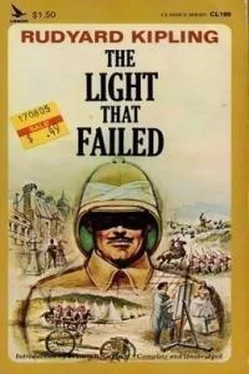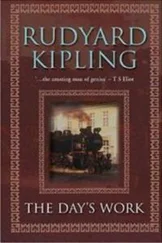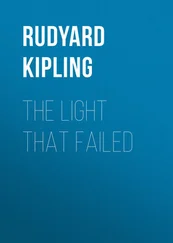'As a general rule,' he explained to his chin–lathered reflection in the morning, 'it isn't safe to cross an old trail twice. Things remind one of things, and a cold wind gets up, and you feel sad; but this is an exception to every rule that ever was. I'll go to Maisie at once.'
Fortunately, the red–haired girl was out shopping when he arrived, and Maisie in a paint–spattered blouse was warring with her canvas. She was not pleased to see him; for week–day visits were a stretch of the bond; and it needed all his courage to explain his errand.
'I know you've been working too hard,' he concluded, with an air of authority. 'If you do that, you'll break down. You had much better come.'
'Where?' said Maisie, wearily. She had been standing before her easel too long, and was very tired.
'Anywhere you please. We'll take a train to–morrow and see where it stops. We'll have lunch somewhere, and I'll bring you back in the evening.'
'If there's a good working light to–morrow, I lose a day.' Maisie balanced the heavy white chestnut palette irresolutely.
Dick bit back an oath that was hurrying to his lips. He had not yet learned patience with the maiden to whom her work was all in all.
'You'll lose ever so many more, dear, if you use every hour of working light. Overwork's only murderous idleness. Don't be unreasonable. I'll call for you to–morrow after breakfast early.'
'But surely you are going to ask―'
'No, I am not. I want you and nobody else. Besides, she hates me as much as I hate her. She won't care to come. To–morrow, then; and pray that we get sunshine.'
Dick went away delighted, and by consequence did no work whatever.
He strangled a wild desire to order a special train, but bought a great gray kangaroo cloak lined with glossy black marten, and then retired into himself to consider things.
'I'm going out for the day to–morrow with Dick,' said Maisie to the red–haired girl when the latter returned, tired, from marketing in the Edgware road.
'He deserves it. I shall have the studio floor thoroughly scrubbed while you're away. It's very dirty.'
Maisie had enjoyed no sort of holiday for months and looked forward to the little excitement, but not without misgivings.
'There's nobody nicer than Dick when he talks sensibly, she though, but I'm sure he'll be silly and worry me, and I'm sure I can't tell him anything he'd like to hear. If he'd only be sensible, I should like him so much better.'
Dick's eyes were full of joy when he made his appearance next morning and saw Maisie, gray–ulstered and black–velvet–hatted, standing in the hallway. Palaces of marble, and not sordid imitation of grained wood, were surely the fittest background for such a divinity. The red–haired girl drew her into the studio for a moment and kissed her hurriedly.
Maisie's eyebrows climbed to the top of her forehead; she was altogether unused to these demonstrations. 'Mind my hat,' she said, hurrying away, and ran down the steps to Dick waiting by the hansom.
'Are you quite warm enough! Are you sure you wouldn't like some more breakfast? Put the cloak over your knees.'
'I'm quite comf'y, thanks. Where are we going, Dick? Oh, do stop singing like that. People will think we're mad.'
'Let 'em think,—if the exertion doesn't kill them. They don't know who we are, and I'm sure I don't care who they are. My faith, Maisie, you're looking lovely!'
Maisie stared directly in front of her and did not reply. The wind of a keen clear winter morning had put colour into her cheeks. Overhead, the creamy–yellow smoke–clouds were thinning away one by one against a pale–blue sky, and the improvident sparrows broke off from water–spout committees and cab–rank cabals to clamour of the coming of spring.
'It will be lovely weather in the country,' said Dick.
'But where are we going?'
'Wait and see.'
The stopped at Victoria, and Dick sought tickets. For less than half the fraction of an instant it occurred to Maisie, comfortably settled by the waiting–room fire, that it was much more pleasant to send a man to the booking–office than to elbow one's own way through the crowd. Dick put her into a Pullman,—solely on account of the warmth there; and she regarded the extravagance with grave scandalised eyes as the train moved out into the country.
'I wish I knew where we are going,' she repeated for the twentieth time.
The name of a well–remembered station flashed by, towards the end of the run, and Maisie was delighted.
'Oh, Dick, you villain!'
'Well, I thought you might like to see the place again. You haven't been here since the old times, have you?'
'No. I never cared to see Mrs. Jennett again; and she was all that was ever there.'
'Not quite. Look out a minute. There's the windmill above the potato–fields; they haven't built villas there yet; d'you remember when I shut you up in it?'
'Yes. How she beat you for it! I never told it was you.'
'She guessed. I jammed a stick under the door and told you that I was burying Amomma alive in the potatoes, and you believed me. You had a trusting nature in those days.'
They laughed and leaned to look out, identifying ancient landmarks with many reminiscences. Dick fixed his weather eye on the curve of Maisie's cheek, very near his own, and watched the blood rise under the clear skin. He congratulated himself upon his cunning, and looked that the evening would bring him a great reward.
When the train stopped they went out to look at an old town with new eyes. First, but from a distance, they regarded the house of Mrs. Jennett.
'Suppose she should come out now, what would you do?' said Dick, with mock terror.
'I should make a face.'
'Show, then,' said Dick, dropping into the speech of childhood.
Maisie made that face in the direction of the mean little villa, and Dick laughed.
'"This is disgraceful,"' said Maisie, mimicking Mrs. Jennett's tone.
'"Maisie, you run in at once, and learn the collect, gospel, and epistle for the next three Sundays. After all I've taught you, too, and three helps every Sunday at dinner! Dick's always leading you into mischief. If you aren't a gentleman, Dick, you might at least—"'
The sentence ended abruptly. Maisie remembered when it had last been used.
'"Try to behave like one,"' said Dick, promptly. 'Quite right. Now we'll get some lunch and go on to Fort Keeling,—unless you'd rather drive there?'
'We must walk, out of respect to the place. How little changed it all is!'
They turned in the direction of the sea through unaltered streets, and the influence of old things lay upon them. Presently they passed a confectioner's shop much considered in the days when their joint pocket–money amounted to a shilling a week.
'Dick, have you any pennies?' said Maisie, half to herself.
'Only three; and if you think you're going to have two of 'em to buy peppermints with, you're wrong. She says peppermints aren't ladylike.'
Again they laughed, and again the colour came into Maisie's cheeks as the blood boiled through Dick's heart. After a large lunch they went down to the beach and to Fort Keeling across the waste, wind–bitten land that no builder had thought it worth his while to defile. The winter breeze came in from the sea and sang about their ears.
'Maisie,' said Dick, 'your nose is getting a crude Prussian blue at the tip.
I'll race you as far as you please for as much as you please.'
She looked round cautiously, and with a laugh set off, swiftly as the ulster allowed, till she was out of breath.
'We used to run miles,' she panted. 'It's absurd that we can't run now.'
'Old age, dear. This it is to get fat and sleek in town. When I wished to pull your hair you generally ran for three miles, shrieking at the top of your voice. I ought to know, because those shrieks of yours were meant to call up Mrs. Jennett with a cane and―'
Читать дальше












